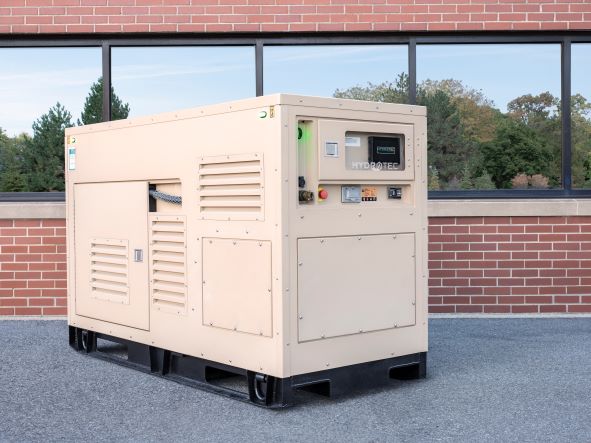
Like Toyota with its rail deal this week, GM has announced new commercial applications for its Hydrotec fuel cell technology.
Projects, currently in development, from heavy-duty trucks to aerospace and locomotives, are being planned for use beyond vehicles for power generation.

Discover B2B Marketing That Performs
Combine business intelligence and editorial excellence to reach engaged professionals across 36 leading media platforms.
GM is planning multiple power generators, all powered by its second generation Hydrotec fuel cell power cubes, including:
- A mobile power generator (MPG) to provide fast-charge capability for EVs without installing permanent charge points
- The Empower rapid charger to help retail fuel stations add affordable DC fast charging without expanding the grid
- A palletised MPG to quietly and efficiently power military camps and installations
These fuel cell generators could ultimately replace petrol- and diesel-burning generators with fewer emissions at worksites, buildings, movie sets, data centres, outdoor concerts and festivals. They could also back up or temporarily replace grid-sourced electricity for residential and small commercial enterprises at times of power disruption.
Each of these power generators feature zero-emissions electric power generation output ranging from 60 kilowatts to 600kW, along with low noise and heat emissions.
“Our vision of an all-electric future is broader than just passenger vehicles or even transportation,” said Charlie Freese, GM executive director of the global Hydrotec business. “Our energy platform expertise with Ultium vehicle architectures and propulsion components and fuel cells can expand access to energy across many different industries and users, while helping to reduce emissions often associated with power generation.”
Mobile power generator
GM is supplying fuel cell power cubes to Renewable Innovations of Lindon, Utah to build the MPG. GM will combine its fuel cell hardware and software with Renewable Innovations’ power integration and management systems to create a generator that can provide fast-charging capability for EVs without having to expand the grid or install permanent charging assets in places where there’s only a temporary need for power.
Multiple development projects involving the MPG are already in process, including a demonstration of the technology as a mobile charging station for EVs, funded in part by the Michigan Economic Development Corporation and the US Army Combat Capabilities Development Command Ground Vehicle Systems Center. This version of the MPG is expected to first be demonstrated in mid-2022.
The California Energy Commission is funding a separate demonstration program of four additional MPGs through its Mobile Renewable Backup Generation Systems programme to show how hydrogen-based mobile power can help offset the loss of energy during the planned power shutoffs used to mitigate wildfires throughout the state.
This demonstration is being led by the Electric Power Research Institute collaborating with stakeholders like GM and Renewable Innovations to help ensure the public has safe, reliable, affordable and equitable access to hydrogen-generated electricity.
Retail EV charging stations
In addition to mobile EV charging, GM and Renewable Innovations have collaborated on the Empower rapid charger. Intended to help retail fuel stations add more affordable DC fast-charging capability, the rapid charger will help deploy necessary fast charging without significant investment in nonrecoverable electrical infrastructure upgrades, like larger feed wires, transformers and potentially new substations.
Rapid chargers can be installed at existing fuel stations or along corridors frequented by travellers only part of the year, such as near national parks or vacation destinations.
The rapid charger, powered by eight power cubes, consumes hydrogen from internal tanks and can DC fast charge as many as four vehicles simultaneously starting at 150 kW with an estimated target full charge time of 20 minutes. Over 100 EVs can potentially be charged before the unit would need to be resupplied with hydrogen.
Renewable Innovations plans to deploy 500 rapid chargers across the country by the end of 2025.
Palletised mobile power generator system
GM designed a separate, palletised version of the MPG which is now being evaluated by US Army Combat Capabilities Development Command Ground Vehicle Systems Center (GVSC). GVSC is also exploring how this version of the MPG can power heavy-duty military equipment and camps. This prototype is equivalent in size to a 60-kW generator and produces nearly 70% more power than traditional diesel generators. This variant also contains features not typically found on diesel generators like battery backup and output regulation.
Powered by a power cube, this MPG prototype converts offboard, bulk-stored hydrogen to electricity generated with no emissions in operation. It generates less noise than a conventional diesel engine at full load and emits water which can be captured and repurposed in the field.
GM will produce fuel cell systems using globally sourced parts at its joint venture with Honda in Brownstown, Michigan. Renewable Innovations will produce the trailer-based MPG and the larger, modular rapid charger in Salt Lake City.






